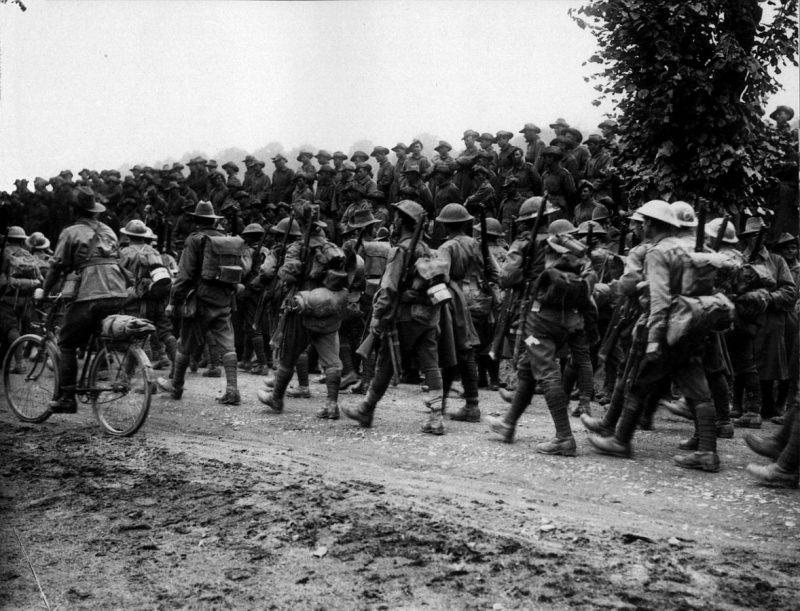This month marks the 100th Anniversary of two of the bloodiest battles fought by ANZAC troops in WW1. These battles, Fromelles, 19th to 20th July 1916 and Poziers, 23rd July to 3rd September 1916, formed part of the Battle of the Somme.
The Battle of Fromelles took place about 16 kilometers from Lille near the Fauquissart – Trivelet road on a flat piece of land that was overlooked by the Aubers Ridge. The ground was low-lying, and the fortifications were earthen breastworks rather than trenches. The battle was fought between, on the Allied side, the XI Corps of the First Army (British forces) partnered with the 61st Division and the 5th Australian Divisions of the Australian Imperial Force (1st AIF) and on the German side was the 6th Bavarian Reserve Division, supported by two divisions of the German 6th Army.
The Australians, after months of fighting at Gallipoli, were not well prepared for this debut battle on the Western front, and many were civilians poorly prepared for trench warfare. The German artillery was well placed on high ground, well trained and provided devastating firepower that decimated the Australian forces. The Australian forces fought bravely, but they gained no ground and did not stop the German military marching onto the Somme. The Australian War Memorial described this battle as “the worst 24 hours in Australia’s entire history” as it resulted in some 5,500 Australian casualties.
The Battle of Poziers also formed part of the Battle of the Somme. The little village of Poziers was a vital cog in the German defensive line of trenches known to the Allies as the O.G. Line. The southern end of this line of trenches had been captured by British forces, and the intention was to sweep the Germans out. To do this they needed to capture the village of Poziers, a task given to the Australians. The ANZAC forces, still reeling from Fromelles, launched their attacks and another bloody, rolling battle ensued.
The Allied forces captured the village, but it was the only Allied gain on that day. As it formed a critical part of their defensive line, the Germans launched a furious counter-attack to regain the village. On the 23rd July, the ANZAC forces repelled three attacks by the German forces and by the morning of the 24th July, the Germans commenced with an all-out artillery bombardment.
On the 25th July, the bombardment intensified and it reached its zenith on the 26th when the Australians asked for a barrage of artillery fire from the Allied forces to assist them. The shelling subsided around midnight, and the Australians had survived the worst bombardment ever experienced by Australian forces. It equaled anything thrown at the Allies on the Western Front. The battle had taken its toll on the Australians who suffered some 23,000 casualties.
These two battles had a profound effect on the psyche of Australians back home. As Joan Beaumont, a WWI historian at the Australian National University said, “there’s no doubt that Australians back home were very aware of how terrible the casualties in Fromelles and Pozieres were. The scale of losses are essentially what triggered the subsequent conscription debates, and the nature of those battles made the debates extremely emotional.”
There was a sound understanding of the huge losses suffered by the ANZAC forces, and the horror of the battles was relayed in letters from servicemen to their loved ones back home. Lieutenant John Raws, wrote, “My tunic is rotten with other men’s blood, and partly splattered with a comrade’s brains. It is horrible, but why should you people at home not know? Several of my friends are raving mad. I met three officers out in No Man’s Land the other night, all rambling and mad.”
These letters all arrived back in Australia at a time when the numbers of volunteers were falling, and the Government entered into a debate as to whether or not they should conscript men to fight overseas. A referendum was held, and the motion was narrowly defeated, but there is no doubt that the battles of Fromelles and Pozieres had a huge effect on the electorate.
The Australians had made their mark on the Western Front of WW1, at great cost to themselves but they had a marked effect on the course of the war and did inflict losses on the German forces. The anniversary of these battles will be somberly observed by all Australians with quiet pride in the bravery and sacrifice made by those thousands of young men.
